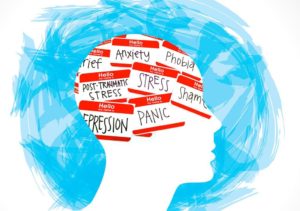BY: Emily Mann
There is always talk of the severity of mental illness and how it can affect everyday life. However, there is very little talk about the statistics of mental health affecting students in college. Individuals mature from high school to college and begin to notice their mental states. Many begin to feel different than they used to. Many begin to notice how they have been feeling and understand that there is something causing their minds to struggle. Students always hear people speak about depression, suicide, anxiety, and stress but never about all of the other illnesses troubling students. Many students deal with the previously listed illnesses as well as eating disorders, ADHD, Bipolar Disorder, Sleep issues and disorders, and addiction and substance use disorders.
Research concludes that 75 percent of mental health struggles start before the age of 24 and 50 – 60 percent of students identify with a mental illness or disorder. This means that the majority of mental health issues begin as students enter college. When students graduate from high school and move to college, life is offering so many new experiences that it can become overwhelming for some people. It is the first time a student lives on their own. It is the first time that there is always a source of alcohol and substance use. The academic expectations and requests become too much that many individuals cannot handle it. It has been proven that Millennials hold onto negative emotions and do not share them with anyone; hoping to push through it themselves. Around 40 percent of students do not seek any form of help with their mental health struggles. There is a fear of stigma and judgment when it comes to voicing personal struggles. Since depression, anxiety, stress, eating disorders, sleep disorders, addiction, bipolar disorder, and ADHD are all a mental issues, it is easy to hide from society and keep all of the pain and suffering to yourself.
So many students fall into depressive episodes or have such high levels of anxiety that an estimate of 2,000 students drop classes due to their mental states. Many of these students also have ADHD, making school difficult overall and causing them to drop out. Untreated Bipolar Disorder is something that affects so many college students but they are not aware that it is this disorder, ultimately giving up in school. Roughly 5.7 million Americans suffer from the manic and depressive episodes of Bipolar Disorder. Freshman entering college have the “freshman 15” scare on their minds a lot. This phrase leads many students to develop an eating disorder. Whether it is trying to lose the “freshman 15” or trying not to gain it, some students may get inside of their minds and develop a disorder. Eating disorders tend to take full affect between the ages of 18 and 24 which is the age of college students. Students that stay up to complete assignments or begin to gain so much stress they can’t sleep develop a sleeping disorder. Insomnia is on of the largest issues because students make their bodies so used to staying up late to finish a term paper that they have created new sleep habits. College students that like to party or drink and abuse substances also tend to drop out or fail out. With the availability to these harmful substances, many students create an addiction and hit a downward spiral. Stress can also lead to the use of drugs and alcohol. The most popular choices being alcohol, Adderall, ecstasy, and marijuana. Research has found that college students make up one of the largest groups nationwide to be drug abusers.
Mental health is something that is hard to get under control and many students never quite control it. Many individuals claim that seeking help has controlled their mental health issues and has made their lives easier. AUM offers Counseling and Health Promotion Services on the third floor of the Taylor Center. They offer free and professional counseling services to try and help students with mental health and anything else they may be struggling with in their college lives.




